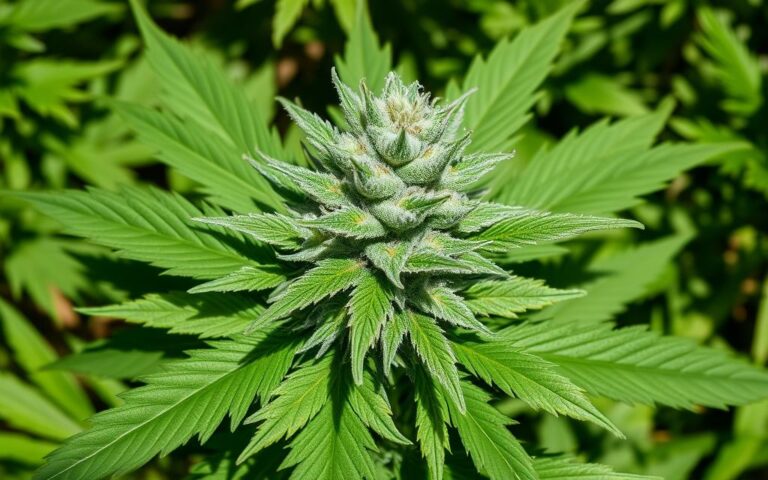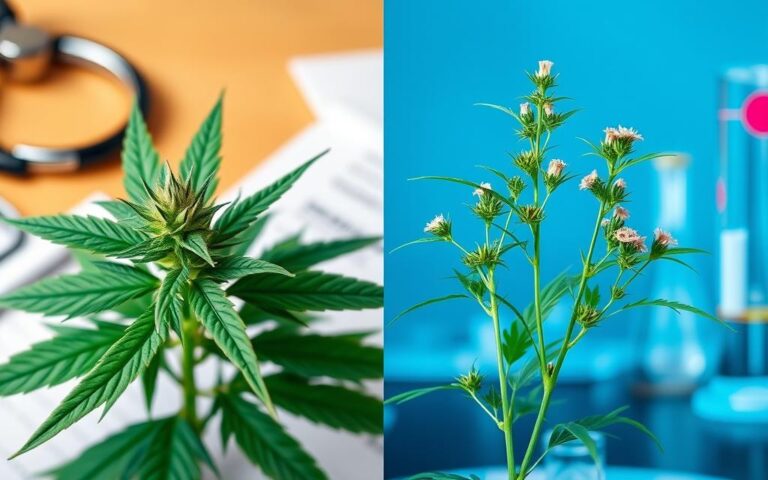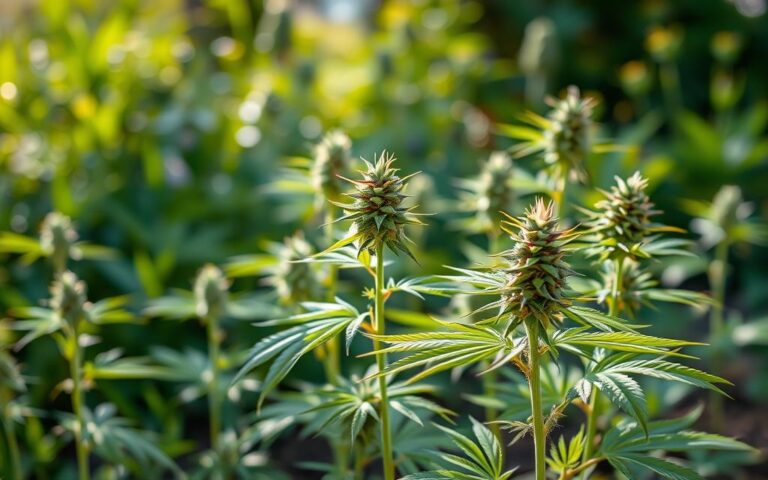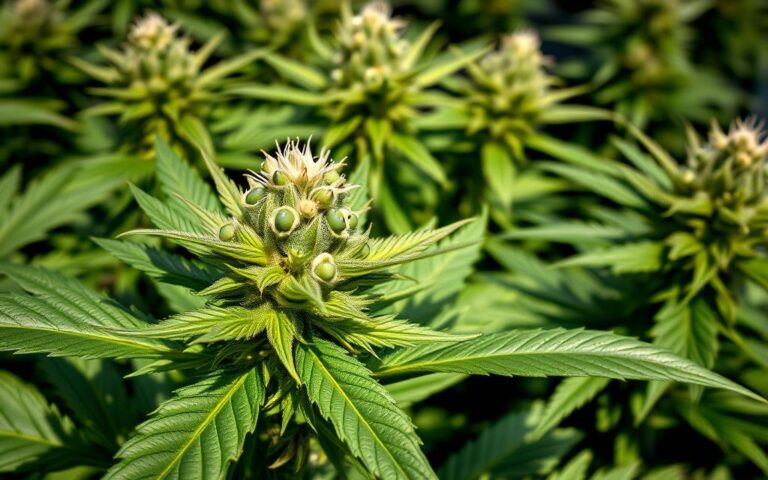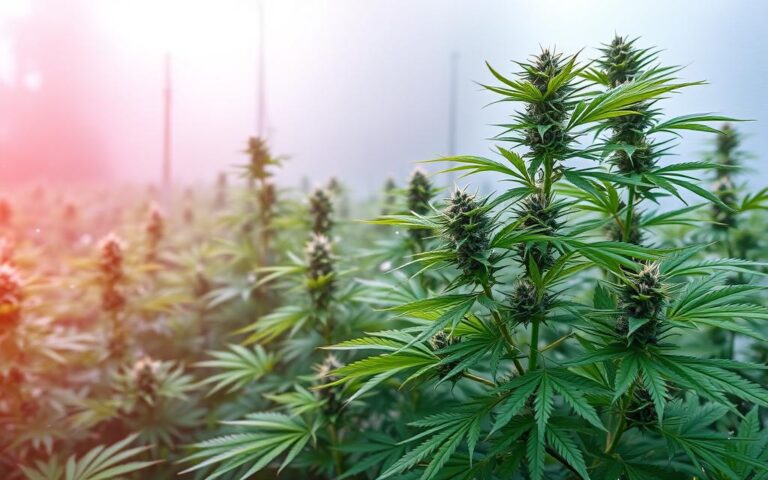Is Lost THC Real? Exploring the Myth and Facts
The idea of “lost THC” is a hot topic amongst weed fans and casual users. Today, over 95 million Americans above 12 have tried cannabis at least once. It’s key to know the difference between cannabis myths and true THC facts. We’re here to dive deep into tetrahydrocannabinol (THC), the part of cannabis that gives you the high.
As more people enjoy cannabis use, the strength of weed is going up. Way back in the mid-1970s, weed had less than 1% THC. But by 2002, this rose to over 6%. This increase sparks lots of questions. Especially about how THC stays in the body. And what it means for people who use cannabis a lot. Not to mention, coming off THC can be tough, with symptoms like mood swings, trouble sleeping, and weight loss.
In this article, we’re clearing up myths about THC staying in the body. Our aim is to give you the facts. We’ll cut through the confusion about cannabis use. By exposing the myths, we hope to give you real info on how THC works in your body. And its effects on your health.
The Basics of THC and its Importance
Knowing about THC is key for anyone getting into the world of cannabis. It’s the main ingredient that makes people feel high. THC works by connecting with parts of our brain. This action has both medical benefits and makes cannabis fun to use.
What is THC?
THC is super important in cannabis. It touches on how we feel, remember things, and handle pain. Its role is huge. We’re seeing stronger strains as research continues. People enjoy it by smoking, vaping, or eating treats.
The Role of THC in Cannabis
But THC isn’t just for fun. It helps with pain and makes people hungry when they need it. Thanks to new rules, we’re learning more about how it can help us medically. Different types of cannabis have different THC, which helps with various health issues.
The care in making sure THC products are safe is vital. People need to know about what they’re using. As products get stronger, knowing about the risks is key. So, learning about THC and its effects is very important.
| Aspect | Details |
|---|---|
| Definition | Delta-9-tetrahydrocannabinol, a psychoactive compound. |
| Effects | Affects mood, memory, and perception of pain. |
| Consumption Methods | Smoking, vaping, edibles, tinctures, and more. |
| THC Levels in Products | Varies widely; labeled as % THC or mg THC. |
| Therapeutic Uses | Pain management, appetite stimulation, and more. |
| Risks | Higher doses may lead to symptoms such as psychosis. |
Understanding THC Metabolism
THC metabolism is how our bodies handle tetrahydrocannabinol. It’s important for understanding how it affects us and drug testing results.
How THC is Processed in the Body
The liver mainly deals with THC, turning it into different substances. Smoked or vaporized THC is about 10% to 35% available to our bodies, but edibles are less so, with a 4% to 20% rate. THC is changed into 11-hydroxy-THC when we eat it, which lasts longer in our system compared to when we inhale THC.
For drug tests, they look for THC-COOH. This shows up in tests from a few days to over a month, based on how often someone uses cannabis. Saliva tests can spot THC for up to 48 hours. However, THC-COOH doesn’t show if someone is currently under the influence, which makes it hard to accurately judge if cannabis has been used recently.
Factors Affecting THC Detection
Many things can change how long THC stays in the system and how tests detect it:
- Frequency of Use: More frequent use leads to longer detection times.
- Body Composition: How our body stores and deals with THC varies with each person’s body weight and fat percentage.
- Method of Consumption: Whether you smoke, vape, or eat cannabis affects how your body processes THC.
Knowing about these factors helps in understanding THC detection times. It also highlights the complexity of how cannabis works in our body. For those into growing cannabis, learning about its growth and busting some myths can be useful. Have a look at common cannabis cultivation myths for more information.
| Factor | Influence on THC Metabolism |
|---|---|
| Frequency of Use | Longer detection times for regular users |
| Body Composition | Storage and breakdown of THC differ by individual |
| Method of Consumption | Bioavailability and effect duration vary significantly |
The Myth of “Lost” THC
The idea of “lost THC” creates confusion and leads to myths about cannabis. It suggests that THC stays in the body long after its effects are gone. This belief makes people think THC stays in the system a lot longer than it really does. But the way our bodies handle THC is quite simple, showing this idea is false.
What Does “Lost THC” Mean?
Some think that after using cannabis, THC sticks around for a very long time. This idea causes unnecessary worry about cannabis’ effects. Studies show that THC can be found in the body for a while, but its mind-altering effects don’t last long. This misunderstanding can make people overly concerned about drug tests and the thought of being impaired for days.
Why Do Myths About THC Persist?
Many things keep these cannabis myths alive. The negative view of marijuana use adds to the confusion. Misinformation is often spread by sources that aren’t based on science, making false ideas popular. Also, stories from pop culture can mislead us, despite what science shows. These factors keep the myth of “lost THC” going and hold on to old-fashioned views on cannabis use.
| Myth | Fact |
|---|---|
| THC remains in the body indefinitely. | THC is metabolised and its effects diminish shortly after consumption. |
| Users experience long-lasting effects post-cannabis. | Any residual effects usually subside within hours. |
| Increased THC retention leads to greater impairment. | Impairment is linked to active THC levels, not detection times. |
Physical and Psychological Effects of THC
It’s important to know about the THC effects for anyone thinking about using cannabis. THC can cause many different physical and psychological changes. These changes can be quite different for each person and depend on how much and how often they use it.
Short-Term Effects
People who take THC usually feel some short-term THC effects. These can include:
- Euphoria, or feeling high.
- Altered sensory perception, making sights, sounds, and tastes seem better.
- Increased heart rate, which changes with how much you take.
- Altered time perception, feeling like time is moving more slowly.
While some find these effects enjoyable, they can sometimes cause negative reactions. This is especially true for those who are not used to THC.
Long-Term Effects on Cognitive Functions
The long-term psychological effects of THC use can be worrisome. Using THC for a long time might harm your attention and memory. Studies suggest these problems might last even if you stop using THC. This is especially true if you started using it as a teenager. Main concerns about long-term THC and cognition include:
- An increased risk of anxiety and depression.
- A greater chance of developing psychotic disorders like schizophrenia, especially with strong strains.
- A slight but lasting effect on memory and concentration skills.
Moreover, ongoing research indicates that regular cannabis users might face more mental health challenges. Early use in teens can severely impact brain development. To learn about how ancient civilizations used cannabis and its effects, check out this resource.

Is Lost THC Real? Debunking the Misconceptions
The idea of lost THC has sparked much debate about how long it stays in the body. Studies have found proof of THC retention evidence in users, leading to false beliefs. These include the idea that lingering THC affects one’s mental and physical abilities. We will look into what this means, especially with regards to cannabis use disorder and THC addiction.
Exploring Evidence for THC Retention in the Body
Researchers have been looking into how THC stays in the body once its immediate effects are gone. In heavy cannabis users, THC can remain detectable in urine tests long after use. However, these users often feel completely normal. This discovery challenges the common belief that cannabis users lose their drive and control.
Studies suggest that while users might experience some mood changes, these are not severe. They don’t suffer from withdrawal or a ‘weed hangover.’ Instead, cannabis can amplify feelings of wonder and creativity, hardly leading to fears like paranoia.
The Reality of Cannabis Use Disorder
About 9% of cannabis users might get cannabis use disorder, a risk that increases with early and frequent use. Regular users, especially those who consume cannabis several times a week, may face a 25% to 50% chance of becoming dependent. Yet, the belief that cannabis kills motivation or leads to poor mental health is largely disproven.
The varied impacts of cannabis show the importance of thinking carefully about its use and dependence. Discussing THC addiction truthfully matters as we address shifting views on cannabis legality and opinions.
Comparative Analysis: THC and Other Substances
It’s important to understand the difference between substances, especially THC versus alcohol. This analysis looks at how they affect the body and mind. Even though they can change how we see things, their effects and risks are quite distinct.
How THC Compares to Alcohol
THC and alcohol affect the mind but in different ways. THC’s effectiveness can change depending on whether it’s smoked or eaten. Alcohol has a higher overdose risk compared to THC. Moreover, THC can be traced in the body much longer than alcohol, which is processed quicker but carries other long-term health concerns.
| Substance | Bioavailability | Detection in Urine | Overdose Risk |
|---|---|---|---|
| THC (Inhaled) | 10%-25% | 30 days or longer | Low |
| THC (Ingested) | 5%-20% | 30 days or longer | Low |
| Alcohol | Varies, generally higher | Varies, typically hours to a few days | High |
Understanding Cannabis as a Gateway Drug
The idea that cannabis leads to harder drugs has been discussed. Research suggests a link between cannabis use and stronger substances. But, it’s not clear if cannabis causes this. The decision to use drugs can be influenced by many factors, not just the substance itself. It’s key to consider all these aspects to fully understand the impact of cannabis and tackle the stigma around it.
Current Research on THC and Cannabis
The study of THC and its effects is constantly advancing. Scientists are exploring how it interacts with our bodies and its addiction risks. They have found both health benefits and risks of using cannabis.
Recent Findings on THC Dependency
As THC levels in cannabis rise, so do concerns about dependency. Before the 1990s, marijuana had less than 2% THC. By 2015, some strains had over 200% more THC than before. Now, strains like Girl Scout Cookie have THC levels between 17% and 28%, with very little CBD.
About 9% of people who try marijuana might get addicted. Daily users face a 25-50% addiction risk. In places like Colorado, teen use has soared since marijuana became legal. For example, in one high school in Pueblo, over 30% of students said they used marijuana in the last month of 2015. These numbers show why we must keep studying the effects of cannabis.
The Future of THC Research
Looking ahead, the study of cannabis and its rules is critical. As more places think about legalising it, we need to understand its impact. This includes health studies on THC products, which can now be as pure as 95%.
Health risks from THC need more attention. For instance, delta-8-THC products caused over 100 health incidents reported to the FDA. Sadly, kids were affected in over 40% of these cases. It’s crucial to ensure safety, especially when some products don’t accurately show their THC level or contain harmful substances.
In short, THC research is crucial as cannabis laws change. Future studies will help us deal with health risks, social attitudes, and legislation. This work will guide us in keeping users informed and safe.
| Year | THC Content (%) | Comments |
|---|---|---|
| Pre-1990s | Less than 2% | Typical THC levels in marijuana |
| 1990s | 4% | Initial increase noted |
| 2015 | 17-28% | Popular strains in legal dispensaries |
| Current | Up to 95% | Concentrated THC products |
Conclusion
In wrapping up our exploration, it is key to highlight the significant insights gained on THC. The myths around “lost THC” are largely baseless. It’s through understanding THC’s effects on the body that these misconceptions are cleared.
The recent spotlight on products like the Lost THC Live Resin THCa Disposable 6g shows how far cannabis consumption has evolved. They offer a unique flavour and potency. This reflects the shift towards a more holistic experience that focuses on both terpenes and cannabinoids.
It’s crucial for the final thoughts on cannabis to promote responsible use and informed discussions. With ongoing research, like the studies from CU Boulder, we are moving towards a future where choices about cannabis are well-informed. This knowledge helps comprehend the complexities of THC and THCa.
FAQ
What is THC?
THC stands for delta-9-tetrahydrocannabinol. It is a key compound in cannabis. THC connects with cannabinoid receptors in the brain. This affects how we feel, remember things, and perceive pain.
How is THC processed in the body?
Mainly, the liver breaks down THC. It turns into various metabolites. These metabolites are what drug tests look for.
What does “lost THC” mean?
“Lost THC” is the false belief that THC stays in the body long after use. This leads to the idea it has lasting effects. That’s not true.
Why do myths about THC persist?
Myths keep going because of social stigma and wrong info. Stories from everyday people also make these myths spread.
What are the short-term effects of THC?
Using THC can make you feel really happy. It can change how you see and hear things. It may also speed up your heart.
Are there long-term effects on cognitive functions from THC use?
Yes, using THC for a long time might affect how you focus and remember. Studies show these issues might stay even when you stop using THC.
Is there evidence for THC retention in the body?
THC can stay in the body for a while. But, just because it’s there, it doesn’t mean you still feel its effects after it stops acting.
What is cannabis use disorder (CUD)?
Cannabis use disorder happens when someone can’t stop using cannabis. It’s less common than addiction to other things, though.
How does THC compare to alcohol?
THC has a lower chance of overdose than alcohol. Still, both can deeply affect your body and mind.
Is cannabis a gateway drug?
There is a link between using cannabis and later using stronger drugs. Yet, we can’t say for sure it’s because of the cannabis. Many other factors play a part.
What are recent findings regarding THC dependency?
New studies are looking at how and why some people might depend on THC. This research is important for understanding cannabis and how it can be used safely.
What is the future of THC research?
Future studies will keep checking the good and bad sides of THC. This is really important as laws change and we learn more about cannabis.





